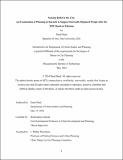Seeking Relief in the City: An Examination of Planning in Karachi to Support Internally Displaced People after the 2022 Floods in Pakistan
Author(s)
Shad, Daud
DownloadThesis PDF (5.856Mb)
Advisor
Sanyal, Bishwapriya
Terms of use
Metadata
Show full item recordAbstract
The 2022 monsoon-season floods in Pakistan caused widespread devastation, resulting in millions of internally displaced people (IDPs) facing difficult choices. Karachi, the country’s largest city and capital of Sindh province, was the destination for tens of thousands of evacuees. Many of these rural-urban migrants ended up in relief camps lacking basic facilities and services. Although the government aimed to address the acute crisis of IDPs entering the city and promote rural rehabilitation, there was minimal accounting for those seeking longer-term support such as resettlement. Still, thousands of IDP households have chosen to stay in Karachi as return has seemed neither safe nor economically feasible. My research – based on key stakeholder interviews and site visits – examines the planning process to accommodate the short- and long-term shelter needs of IDPs who arrived in the city after the floods. It considers the impact of uncertainty on the affected population as well as the critical role of civil society in addressing the crisis. As climate change is exacerbating forced migration, how can the humanitarian response to support IDPs in a megacity like Karachi be more equitable and sustainable? This research recommends that key actors in Karachi plan for a comprehensive and flexible array of shelter and settlements programming to meet the various needs of people after disaster displacement. Additionally, IDPs in 2022 could have been better served through more accessible information on housing and coordination across relief sites. Adopting such measures may decrease the uncertainty inherent in humanitarian response and advance urban planning in assisting populations devastated by circumstances beyond their control.
Date issued
2024-05Department
Massachusetts Institute of Technology. Department of Urban Studies and PlanningPublisher
Massachusetts Institute of Technology